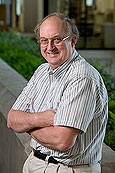Bill Bardeen, renowned quantum field theorist, retires
 |
| Bill Bardeen Photo: Reidar Hahn |
From quantum chromodynamics to family genealogy, Bill Bardeen loves to solve puzzles.
As a theoretical physicist, his approach to solving physics problems about the fundamental nature of matter made him a world-leading expert on quantum field theory. In his spare time, as a genealogist, the same persistence resulted in tracing the Bardeen family line back to Massachusetts in 1717.
In December, after 35 years of tackling theoretical physics problems at Fermilab, Bardeen retired. There is little doubt, however, that he will continue to be fascinated by puzzles.
“I have to get really into a problem,” Bardeen said. “I strive to understand things as deeply as I can.”
Bardeen joined Fermilab’s theory group in 1975 on the invitation of Ben Lee, a Fermilab pioneer who chaired the group from 1973 until his tragic death in 1977. Bardeen was working as a professor in Stanford University's physics department, but the opportunity to collaborate with Lee, whom he had worked with as a post-doc at Stony Brook University in the '60s, made the decision easy, at least for him.
Bardeen’s wife, Marge Bardeen, who heads Fermilab’s Education Office, and his two children, were not as keen to leave sunny California behind, he recalled.
“The vote was three to one, but the tally got overwhelmed by one vote in particular,” Bardeen said. “I felt that I could do my best physics here.”
There was no denying that the Bardeens were Midwesterners at heart. Bill Bardeen was born in Pennsylvania and moved to Champaign, Illinois when he was nine. He met Marge in a chemistry class during his senior year of high school, but they didn’t start dating until they were both students at Cornell University. They married his junior year of college and went on to have two children, Chuck and Karen.
Bardeen is best known for his work on quantum field theory anomalies, which play a fundamental role in defining the Standard Model of particle physics. He received the J.J. Sakurai Prize of the American Physics Society in 1996 for his work on quantum chromodynamics. In 1984, he became a Fellow of the American Physical Society and was elected to the American Academy of Arts and Sciences in 1998, the National Academy of Sciences in 1999 and as a fellow of the American Association for the Advancement of Science in 2008. He chaired Fermilab’s theory group from 1985 to 1992, spent a year as the head of theory group at the Superconducting Super Collider, and then returned to Fermilab when the project was canceled in 1993.
Read more
-- Elizabeth Clements
|